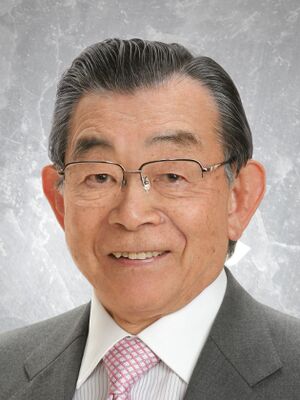Difference between revisions of "Toyoo Gyohten"
m (small biography) |
(expanding CV) |
||
| Line 1: | Line 1: | ||
{{person | {{person | ||
| − | |wikipedia= | + | |wikipedia=https://translate.google.com.au/translate?sl=ja&tl=en&u=https%3A%2F%2Fja.wikipedia.org%2Fwiki%2F%25E6%25A6%258A%25E5%258E%259F%25E8%258B%25B1%25E8%25B3%2587 |
|image=Toyoo gyohten.jpg | |image=Toyoo gyohten.jpg | ||
|birth_date=1931 | |birth_date=1931 | ||
|death_date= | |death_date= | ||
| − | |constitutes=banker | + | |constitutes=banker,economist |
|nationality=Japanese | |nationality=Japanese | ||
|description= | |description= | ||
|sourcewatch=https://www.sourcewatch.org/index.php/Toyoo_Gyohten | |sourcewatch=https://www.sourcewatch.org/index.php/Toyoo_Gyohten | ||
| − | | | + | |alma mater=Waseda University,University of Tokyo, Princeton University |
|employment={{job | |employment={{job | ||
|title= Institute of International Finance/Chairman | |title= Institute of International Finance/Chairman | ||
| Line 15: | Line 15: | ||
}} | }} | ||
}} | }} | ||
| − | '''Toyoo Gyohten''' worked as a senior civil servant in the mighty [[Japan/Ministry of Finance|Ministry of Finance]] and is former Vice Minister of Finance. | + | For 50 years, '''Toyoo Gyohten''' was part of the Japanese financial planning leadership. He worked as a senior civil servant in the mighty [[Japan/Ministry of Finance|Ministry of Finance]] and is former Vice Minister of Finance. |
==Career== | ==Career== | ||
| − | "Gyohten | + | After graduating from university in [[1955]], he joined the Ministry of Finance and was assigned to the Administration Department of the Customs Department of the Main Tax Bureau. |
| + | |||
| + | From September 1956, he studied abroad at [[Princeton University]] Graduate School of Social Economics in the [[United States]]. When he returned home from study abroad two years later, he worked for the exchange office. | ||
| + | |||
| + | In 1984, he became the director of the International Finance Bureau, where he witnessed the [[Plaza Agreement]] the following year and became known as part of the "currency mafia" representing Japan. Furthermore, from June the following year to July 1989, he served as a finance officer and was involved in the [[Louvre agreement]] to stabilize the US dollar. | ||
| + | |||
| + | After retiring in 1990, Gyohten became president of the [[Institute for International Monetary Affairs]], and advisor to the [[Bank of Tokyo]]. He is also senior advisor of the [[Bank of Tokyo-Mitsubishi]], and special adviser to the prime minister of Japan. | ||
| + | |||
| + | He is a member of a number of institutions dedicated to financial and economic development, among which are the [[Bretton Woods Committee]], the Advisory Board of the [[East African Development Bank]], the [[Aspen Institute]], the [[Group of Thirty]], and the [[Trilateral Commission]]." <ref>[http://www.cfr.org/bios/9561/toyoo_gyohten.html Toyoo Gyohten], Council on Foreign Relations, accessed September 21, 2008.</ref> | ||
| + | |||
| + | In October 2016, he retired as chairman of the Institute for International Monetary Affairs and became an honorary advisor | ||
*International Advisory Board, [[Council on Foreign Relations]] | *International Advisory Board, [[Council on Foreign Relations]] | ||
| Line 25: | Line 35: | ||
==References== | ==References== | ||
{{reflist}} | {{reflist}} | ||
| − | |||
Revision as of 16:09, 22 August 2020
(banker, economist) | |
|---|---|
 | |
| Born | 1931 |
| Nationality | Japanese |
| Member of | Council on Foreign Relations/Global Board of Advisors, Goldman Sachs/International Advisors, Group of Thirty, Trilateral Commission |
For 50 years, Toyoo Gyohten was part of the Japanese financial planning leadership. He worked as a senior civil servant in the mighty Ministry of Finance and is former Vice Minister of Finance.
Career
After graduating from university in 1955, he joined the Ministry of Finance and was assigned to the Administration Department of the Customs Department of the Main Tax Bureau.
From September 1956, he studied abroad at Princeton University Graduate School of Social Economics in the United States. When he returned home from study abroad two years later, he worked for the exchange office.
In 1984, he became the director of the International Finance Bureau, where he witnessed the Plaza Agreement the following year and became known as part of the "currency mafia" representing Japan. Furthermore, from June the following year to July 1989, he served as a finance officer and was involved in the Louvre agreement to stabilize the US dollar.
After retiring in 1990, Gyohten became president of the Institute for International Monetary Affairs, and advisor to the Bank of Tokyo. He is also senior advisor of the Bank of Tokyo-Mitsubishi, and special adviser to the prime minister of Japan.
He is a member of a number of institutions dedicated to financial and economic development, among which are the Bretton Woods Committee, the Advisory Board of the East African Development Bank, the Aspen Institute, the Group of Thirty, and the Trilateral Commission." [1]
In October 2016, he retired as chairman of the Institute for International Monetary Affairs and became an honorary advisor
- International Advisory Board, Council on Foreign Relations
- Board of Overseers, International Center for Economic Growth [2]
References
- ↑ Toyoo Gyohten, Council on Foreign Relations, accessed September 21, 2008.
- ↑ Overseers, Trustees and Officers, International Center for Economic Growth, accessed September 21, 2008.